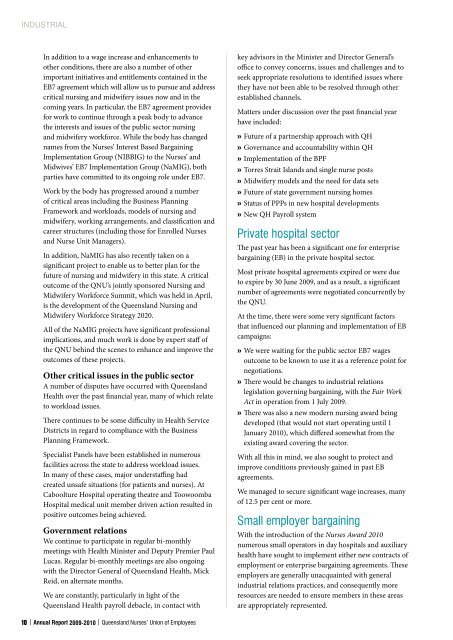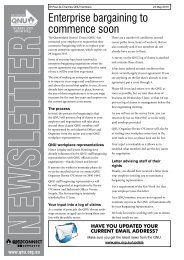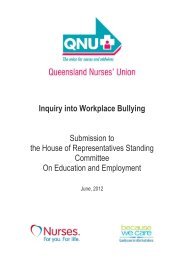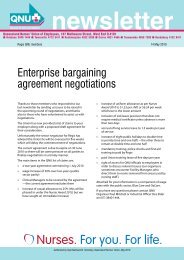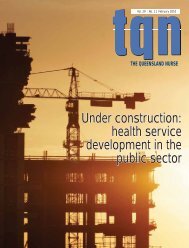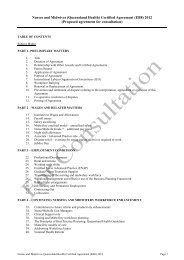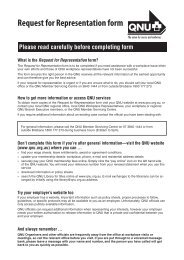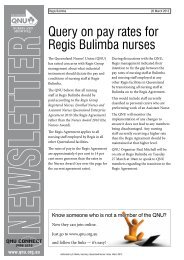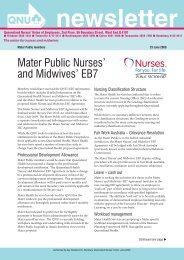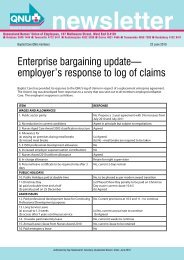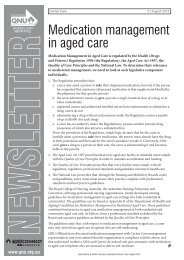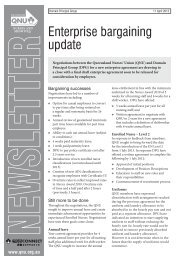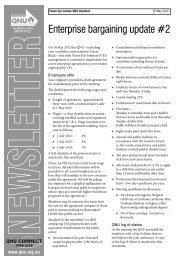ANNUAL report - Queensland Nurses Union
ANNUAL report - Queensland Nurses Union
ANNUAL report - Queensland Nurses Union
You also want an ePaper? Increase the reach of your titles
YUMPU automatically turns print PDFs into web optimized ePapers that Google loves.
INDUSTRIALIn addition to a wage increase and enhancements toother conditions, there are also a number of otherimportant initiatives and entitlements contained in theEB7 agreement which will allow us to pursue and addresscritical nursing and midwifery issues now and in thecoming years. In particular, the EB7 agreement providesfor work to continue through a peak body to advancethe interests and issues of the public sector nursingand midwifery workforce. While the body has changednames from the <strong>Nurses</strong>’ Interest Based BargainingImplementation Group (NIBBIG) to the <strong>Nurses</strong>’ andMidwives’ EB7 Implementation Group (NaMIG), bothparties have committed to its ongoing role under EB7.Work by the body has progressed around a numberof critical areas including the Business PlanningFramework and workloads, models of nursing andmidwifery, working arrangements, and classification andcareer structures (including those for Enrolled <strong>Nurses</strong>and Nurse Unit Managers).In addition, NaMIG has also recently taken on asignificant project to enable us to better plan for thefuture of nursing and midwifery in this state. A criticaloutcome of the QNU’s jointly sponsored Nursing andMidwifery Workforce Summit, which was held in April,is the development of the <strong>Queensland</strong> Nursing andMidwifery Workforce Strategy 2020.All of the NaMIG projects have significant professionalimplications, and much work is done by expert staff ofthe QNU behind the scenes to enhance and improve theoutcomes of these projects.Other critical issues in the public sectorA number of disputes have occurred with <strong>Queensland</strong>Health over the past financial year, many of which relateto workload issues.There continues to be some difficulty in Health ServiceDistricts in regard to compliance with the BusinessPlanning Framework.Specialist Panels have been established in numerousfacilities across the state to address workload issues.In many of these cases, major understaffing hadcreated unsafe situations (for patients and nurses). AtCaboolture Hospital operating theatre and ToowoombaHospital medical unit member driven action resulted inpositive outcomes being achieved.Government relationsWe continue to participate in regular bi-monthlymeetings with Health Minister and Deputy Premier PaulLucas. Regular bi-monthly meetings are also ongoingwith the Director General of <strong>Queensland</strong> Health, MickReid, on alternate months.We are constantly, particularly in light of the<strong>Queensland</strong> Health payroll debacle, in contact withkey advisors in the Minister and Director General’soffice to convey concerns, issues and challenges and toseek appropriate resolutions to identified issues wherethey have not been able to be resolved through otherestablished channels.Matters under discussion over the past financial yearhave included:»»Future of a partnership approach with QH»»Governance and accountability within QH»»Implementation of the BPF»»Torres Strait Islands and single nurse posts»»Midwifery models and the need for data sets»»Future of state government nursing homes»»Status of PPPs in new hospital developments»»New QH Payroll systemPrivate hospital sectorThe past year has been a significant one for enterprisebargaining (EB) in the private hospital sector.Most private hospital agreements expired or were dueto expire by 30 June 2009, and as a result, a significantnumber of agreements were negotiated concurrently bythe QNU.At the time, there were some very significant factorsthat influenced our planning and implementation of EBcampaigns:»»We were waiting for the public sector EB7 wagesoutcome to be known to use it as a reference point fornegotiations.»»There would be changes to industrial relationslegislation governing bargaining, with the Fair WorkAct in operation from 1 July 2009.»»There was also a new modern nursing award beingdeveloped (that would not start operating until 1January 2010), which differed somewhat from theexisting award covering the sector.With all this in mind, we also sought to protect andimprove conditions previously gained in past EBagreements.We managed to secure significant wage increases, manyof 12.5 per cent or more.Small employer bargainingWith the introduction of the <strong>Nurses</strong> Award 2010numerous small operators in day hospitals and auxiliaryhealth have sought to implement either new contracts ofemployment or enterprise bargaining agreements. Theseemployers are generally unacquainted with generalindustrial relations practices, and consequently moreresources are needed to ensure members in these areasare appropriately represented.10 | Annual Report 2009-2010 | <strong>Queensland</strong> <strong>Nurses</strong>’ <strong>Union</strong> of Employees


